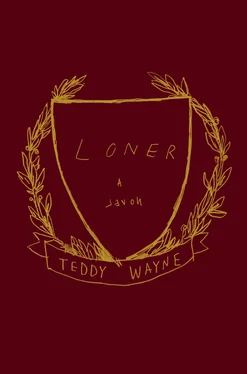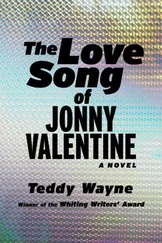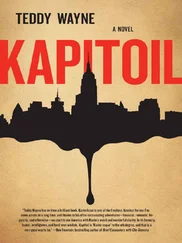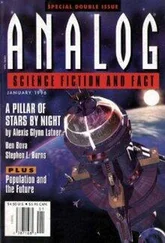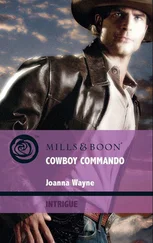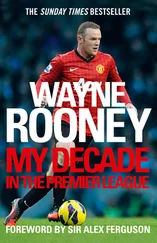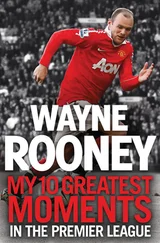“David’s in college,” my mother told her. “He’s allowed to visit his friend in the city if he wants.”

Before leaving I mapped out which subway to take down to Zipper & Button, the clothing boutique in SoHo whose label was on your black sweater. Riding the A train, my reflection in the window that of a disgruntled native, I thought of taking a selfie and sending it to Daniel Hallman, telling him I was clothes shopping in downtown Manhattan today; did he want me to pick up anything for him, or did he prefer to stick to the mall?
The streets were clogged with shoppers chasing post-Thanksgiving sales. Zipper & Button, however, advertised no holiday deals and was empty but for two unsmiling female clerks. They looked up from their conspiratorial huddle behind the counter and gave me a cold, cursory appraisal.
With its exposed-brick walls and creaky floors, the space felt more like someone’s home than a store. From speakers whispered an acoustic guitar and a woman singing in what sounded like a Scandinavian dialect. Inventory was sparse and didn’t look particularly masculine. It occurred to me this might be a women’s-only shop.
I took another lap around the racks to check that I hadn’t missed anything. This time I located a sweater identical to the one you wore, two lines of stitching from the shoulders meeting at the chest, only in gray instead of black. I brought it to the counter.
“Is this men’s?” I asked.
“Unisex,” they answered together. Xesinu.
I took it into the dressing stall and pulled it over my T-shirt. It softly conformed to my upper body, a luxurious departure from the lumpy, scratchy sweaters of unwanted childhood gifts. Next to my Gap jeans and Foot Locker sneakers, it looked incongruous, the brooding musician whose siblings were a dentist and a database administrator. I needed a whole new wardrobe, but this was a start. For the price I’m paying , I heard my father grumble, you’d think they could throw in a pair of pants.
I charged the sweater to my debit card, wore it out of the store, hopped on the uptown 6 train, and walked over to Park Avenue, where I found the elegant prewar residence of good ol’ Larry and Margaret.
My plan was to sit in a restaurant or coffee shop with a view of your building. At some point you’d pop out for a cigarette, and that’s when our coincidental run-in would transpire. I’d dart out and we’d laughingly exchange What are you doing here? s. Oh, I just saw a friend, but I have a few hours to kill before my train; sure, I could join you for a walk through Central Park. Away from school, away from Tom and Liam and Suzanne and Jen and Christopher and Andy and everyone else, you could be your unguarded self. Don’t take the train back, you would plead as dusk descended. Stay here, my parents are dying to meet you. You’d bring me back to your apartment, feverish with excitement. So this is the David we’ve been hearing so much about! Margaret would swoon.
But during my many jaunts down your block through Google Street View, I’d failed to notice the critical oversight in my strategy: Park was strictly residential. There wasn’t a single commercial establishment that could serve as an inconspicuous hideout; it was as if the avenue were designed to discourage the casual lurker.
A landscaped meridian bisected north- and southbound lanes of traffic, with concrete embankments serving as islands for pedestrians who didn’t catch the green light in time to make it all the way across the boulevard. Raised flower beds bordered interior strips of each median that had held grass in warmer months.
I stood in the middle of the crosswalk opposite your building, surveying my options. If I waited on the sidewalk right outside your home, I would blow my cover; if you saw me sitting on the edge of the island’s empty flower bed, you’d know I was on a stakeout. Failing to come up with a better solution, I decided to stay put. Under the pretense of waiting to cross the street, I remained adrift on my concrete no-man’s-land, eyes fixed on the green awning that canopied a set of double doors from which you might at any point emerge.
As the afternoon sun sank, suffusing the street with a tangerine glow, the indigenous species of the Upper East Side meandered by, women with pinched faces and coiffed hair, their toy dogs snug in cashmere sweaters, nonagenarians escorted by uniformed help, teens in sweatpants with the names of their prep schools scrolled in oversized fonts down the legs, towheaded toddlers slumbering in strollers.
Your building’s doorman, dressed in a brass-buttoned suit and a porter’s hat, maintained equal vigilance from his post inside your lobby so as not to be caught unawares by an approaching resident. And he never was, always anticipating the precise moment to turn the handle and swing the door open, stepping aside and acknowledging the occupant’s return with a deferential nod.
Every so often the door would open and he’d march out on his own to the curb, blow a whistle, and wave a white-gloved hand at the oncoming traffic. A yellow cab would screech to a stop in front of the awning and a resident would materialize from the lobby and climb in.
After one of these excursions, rather than going back inside the building, he headed over to my island. I typed pointlessly into my phone.
“You waiting for someone?” he asked in a gruff outer-borough accent.
“I’m doing a study on pedestrian traffic for Harvard University,” I told him. “I’m measuring the ebb and flow of population density and calculating carrying capacity.”
I held up my phone, ostensible proof of my scientific method.
“Harvard?” He grimaced, looked around as if uncertain what to do with this information, and nodded. “All right.”
Evening set in. The temperature dropped and it began drizzling. I thought about running over to another avenue to buy an umbrella, but if you chose that interval for your appearance, all my work would have been for naught.
The sky cleaved and the drizzle turned into a downpour. The only awning nearby was your own, and I couldn’t make that my haven. All I could do was stay in place, getting soaked as walkers scattered and I remained the one person outside sans umbrella.
On top of being wet, I was hungry, cold, and tired from standing. I didn’t know if you were home; if so, when you’d be leaving; or, if you were out, when you’d be returning. Yet the adverse conditions only fortified my determination. I was scaling Everest. It’d be another heroic story to tell you someday.
As it turned out, you were home.
You carried an open umbrella out of the lobby around ten o’clock, walked to the corner opposite where I stood, and stepped off the curb. My fatigued quadriceps contracted with anticipation. I stayed where I was, assuming you were going to cross the street in my direction, but instead you held up your hand to hail a taxi, forgoing your doorman’s services.
“Hey!” I yelled, but my voice was lost in the thrum of raindrops and whistling traffic. Two cabs spotted you simultaneously and jockeyed for your fare at the corner. While you folded your umbrella and climbed into the nearest one, I made a cavalier dash across the street. Your car took off as I jumped into the second cab, my wet jeans squeaking against the pleather seat.
“Follow that cab directly in front of us,” I told the driver. “Please.”
A chase sequence in traffic-jammed Manhattan wasn’t as exhilarating as it might sound. We stopped at frequent red lights; our cars never exceeded fifteen miles per hour; my driver yammered on the phone the whole time in a foreign language.
Читать дальше
